📅 13 Feb 2025 • 📖 10 min read
— By Dr. Sandip Roy.When you’re financially strapped, leaving a narcissist is a hard decision.
Here’s the truth: If ever thought of leaving your narcissist, you already know what to do. Your decision didn’t make it to action because it wasn’t the right moment.
You knew, as soon as they sense you might leave, they will do their best, and even bring out their worst, to hoover you back into the relationship.
It may seem poetic justice to walk out of your abuser’s house in the same dress you’re standing in right now. To ghost them and disappear forever.
You were right — that would be a doomed idea. There are so many plans to make first.
But only if your haywire mind could lay them out neatly for you …
Read on to find some of the most practical tips to leave your narcissist safely and strategically.
How to leave a narcissist with no money?
From the day you fall for them, your narcissist will try to make you dependent on them — emotionally, psychologically, and financially. Because now you can’t leave them, despite their abuse.
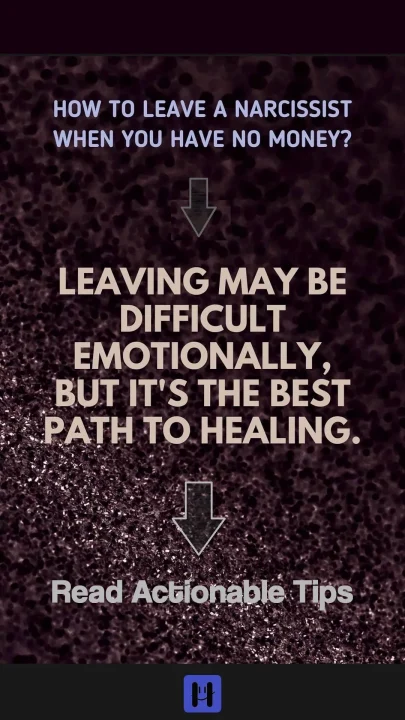
“It doesn’t take a narcissist long to start their abuse; it takes you time to notice it.”
They try their best to retain you because they “trained” you into someone with learned helplessness. They would rather not spend that time or energy training another.
- To stop you, they will shower you with kindness and love, restart love bombing, or bring you gifts.
- They can become their cruel selves — threatening you with revenge on you and your loved ones.
- Or, they might bring out their saddest act, being tearful, looking haggard, sighing often, and telling how sorry they are for their behavior.
“Don’t feel sorry for leaving them. They wouldn’t be any if they were leaving you.”
Your narcissist will leave you when they are done with you. Do the same before they discard you, even if they are dependent on you in some way.
They can readily snap into action if they sense a loss of their narcissistic supply—which is you.
1. Prepare before it’s time.
Plan meticulously and secretly.
Once you make that decision of leaving, keep it secret from them. Because if they already haven’t, they will likely drain your money and resources.
Give yourself at least 2 weeks to plan it all.
- Make lists—things to take, things to do, and things to undo.
- Gather your important documents. Gather every valuable thing. Keep them in a bank safe.
- Log out of all your internet accounts. Change all your passwords. Check your devices and bags for trackers.
- Send some of the things to your new address, or ask the person you’ll move in with to carry your things with them. You may also make trips to your new place with a few things each time.
- Plan to slip out when the narcissist is away for at least half a day.
- Make sure that your exit is a quick one. Quickly pack everything that you made lists of, and leave.
- If you’d like, take the things you gave them as gifts. But leave behind any gift that they gave you.
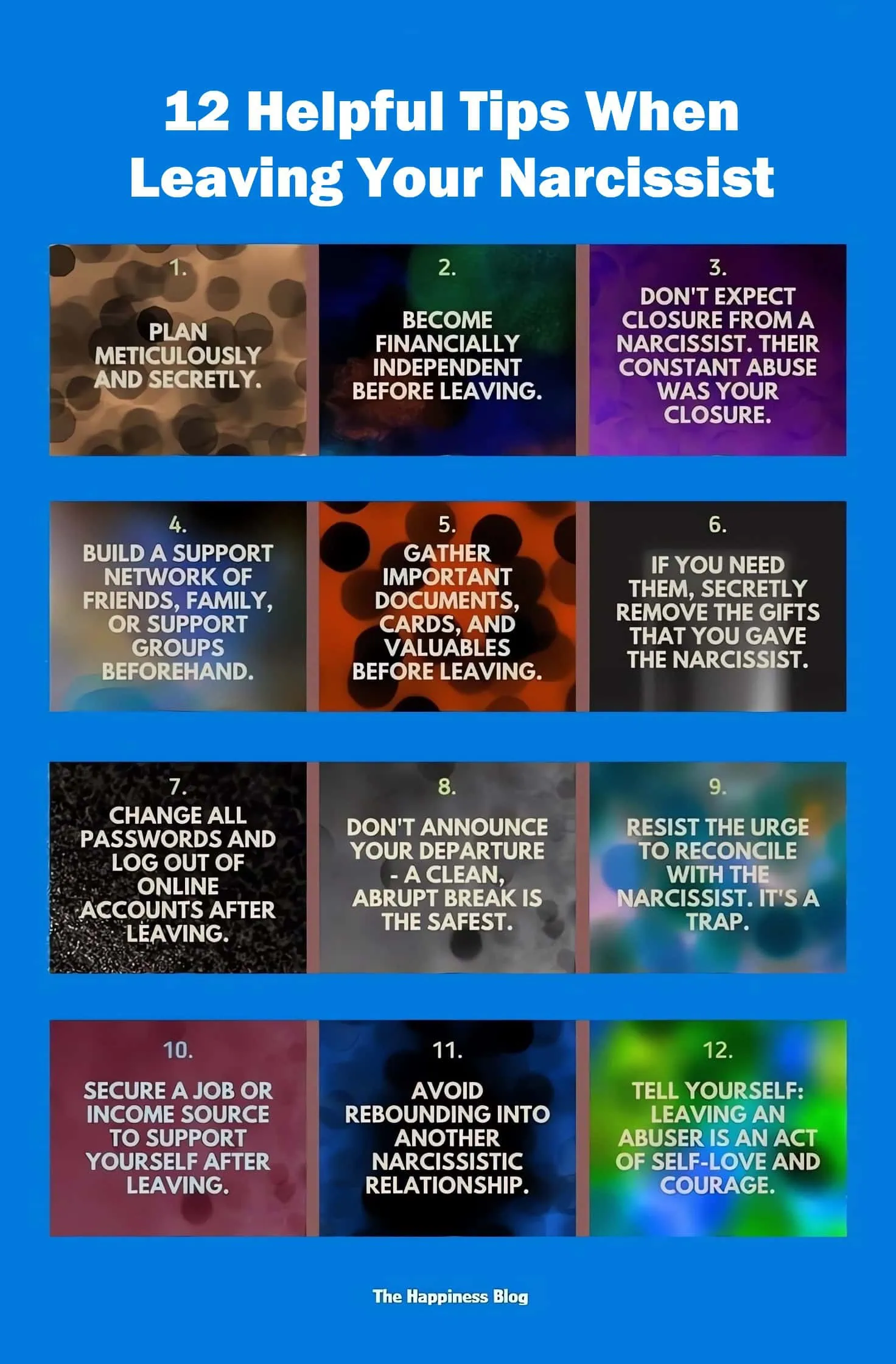
2. Don’t look for closure.
People often look for psychological closure when they end their relationships.
They do so because they know it’s over forever and there is nothing to expect from the other person in the future.
Don’t make that mistake with a narcissist.
First, they will never give you closure. You would be fooling yourself if you expect a farewell party or a final ride with them to your new place.
Once again, don’t tell them you’re leaving the relationship.
You have to leave without any announcement. Don’t even bother leaving a goodbye note. You do that to keep yourself safe.
Once again, do not let get a whiff of it. If they know, they will make your life hell. They will leave you in such a pitiful state that only begging on the streets can get you to have your meals.
When you leave them, the only thought making rounds in their head: You discarded them before they could.
This unpleasant surprise of yours bites them viciously. That is the ultimate narcissistic injury.
3. Gather support.
Build your army in secret, months ago.
Abusive narcissists try to isolate you from your social support system. They turn you against your friends and family by lying, gossiping, and gaslighting.
Gather as much support as you can. Reach out to friends and family.
Reconnect with your family and old friends, even if it feels shameful because you cut them off when you got together with the narcissist.
If some of them would rather not reconnect, don’t bother them. They need to be pruned away from your life.
Get help from narcissist abuse survivor groups or women’s surviving groups when your friends or family cannot put you up.
First, if you feel the narcissist is behaving dangerously and stalking you or planning to harm you, let the police know beforehand. Report what they have done to you over the years and what they might do.
Don’t hesitate to call 911.
If you’ve never made any attempt to leave them, you may not realize how dangerous they can turn into upon feeling injured by your discard.
Don’t believe their flattery. Remember, you have to pay back all their flattery with your servitude to them.
Even if they become extra gentle to you, and stop their physical and mental abuse on you, don’t get hoovered back into the relationship.
Your best protection is your courage. Your second-best protection is your support groups.
Reach out to as many people as you can to help you move out of their clutches.
People may not help you directly or even indirectly, but they will know that you are leaving the narcissist. This leaves a trail of witnesses and supports your case if the narcissist ever attacks you.
If you cannot find a safe place to go, look for a domestic violence women’s shelter.
Emergency Domestic Violence Shelters mostly provide free stays of 30 to 90 days. Once there, register with your local HUD (Housing and Urban Development) office. They prioritize people leaving domestic abuse or with impairments on their subsidized housing availability lists.
You may consult a divorce attorney specialized in divorces of narcissistic and abusive relationships.
4. Get an income.
Their financials are opaque. You will never know how much they make or what amount they spend away.
Narcissists mostly make one-sided money decisions. Most likely, they have been dictating your financial budget and investments.
Before you move out, make sure you have the money to pay off your debts. Arrange to have some spare cash on you.
If you owe your creditors but do not have the money, then borrow from friends or take a personal loan to settle their credit.
Get a job. There are many online remote jobs these days. Get a second job, if necessary.
Find out beforehand how much it will cost to rent an apartment for three months, including all related expenses.
Keep some extra money, so you can buy out of your way in an emergency.
If you need to, borrow money via a loan, start a separate account, liquidate your assets, and put it in that account.
If you can’t get a loan or borrow money, put money aside every paycheck – even if it is only a few dollars.
When you get a job, you can start paying off your debts and loans.
When you start to pay everyone on time, it will give you time to think over what you want to do. It will let you peacefully plan how you can add to your skills, so you may use them to increase your income.
Make sure you can pay for your child support, health expenses, and alimony.
Setting down in financial comfort is often a long rollercoaster ride.
Don’t rush anything. Practice wisdom-laced patience.
5. Don’t rush into another narcissistic relationship.
This is quite common—walking into a rebound affair with another narcissist.
Narcissists wrap you in trauma bonding, so you feel empty without their presence.
Once you leave them, they have conditioned you such that you will often fall back on remembering the good things you have done together.
You even fantasize that if they come begging to get you back, this time you will control them and heal them after you accept them.
But it won’t happen. Neither with your old narcissistic relationship nor with any new narcissist.
A narcissist is like a scorpion; they will all attack you at the first instance they get.
They don’t take time to insult you. It is only you who fails to take notice of those behaviors as abuse.
Don’t give any narcissist a second chance. They will do you bad things even if you’re visibly hurting because they do not have empathy.
Your mind might replay the pleasant memories you had with them, and nudge you to go back. However, know that you don’t have to always go by what your thoughts tell you.
A narcissist doesn’t like you because they love you. They like you because you provide the narcissist with what they need – their narcissistic supply.
All their acts of “liking and loving” you are their tolerating you so that they can manipulate you. It’s like, “I did these for you, now you do these for me.”
They are hypocritical, entitled people who believe the rules do not apply to them, letting them take advantage of you without shame.
Actually, they dislike you. Devaluation, manipulation, and discard are all they will ever have for you.

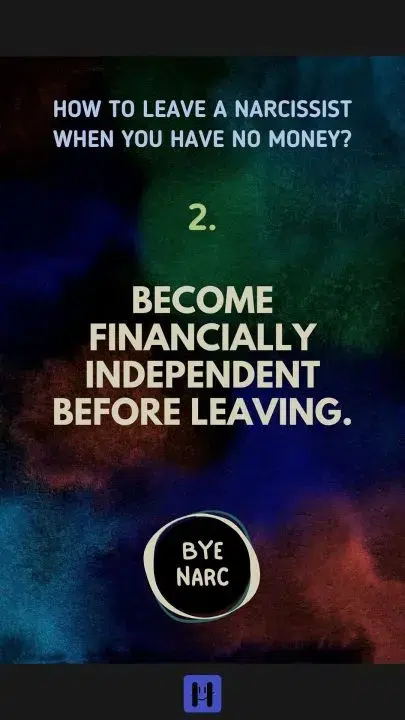
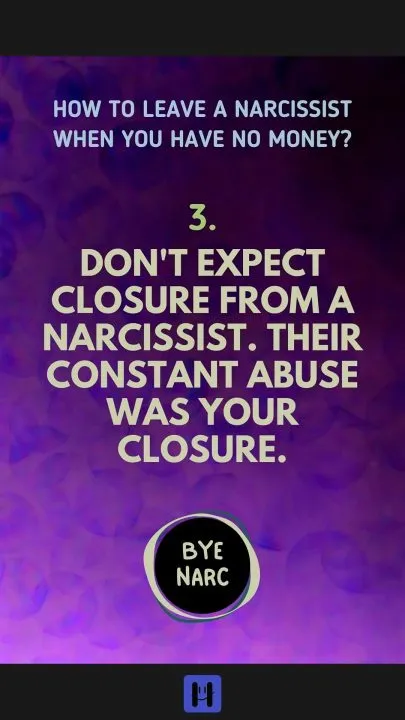
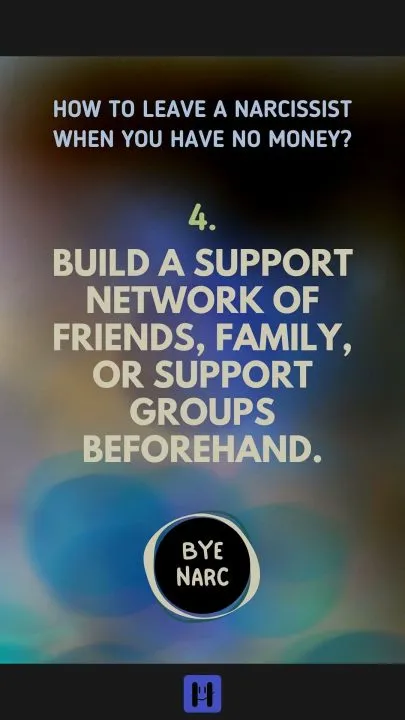
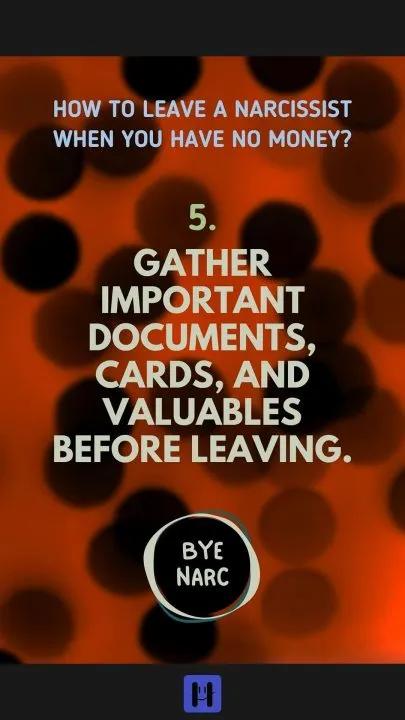


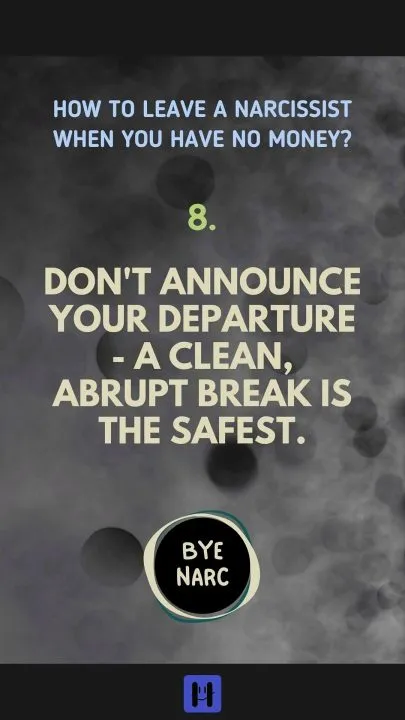
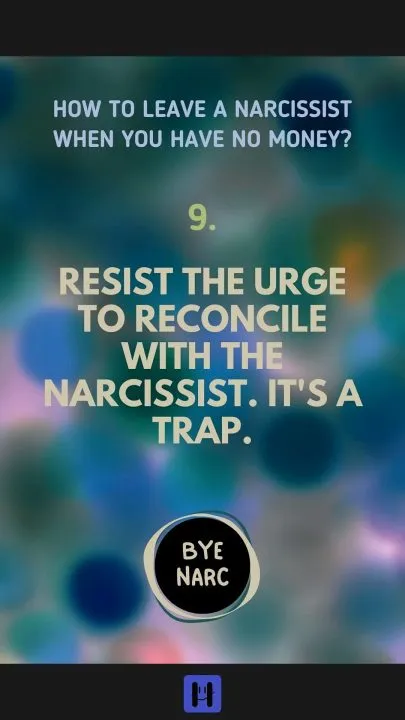
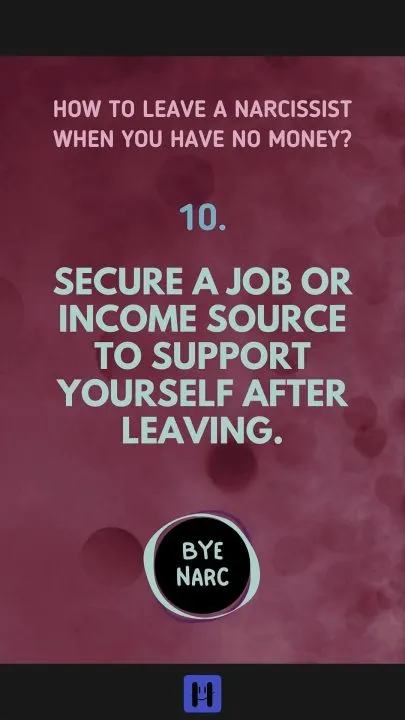
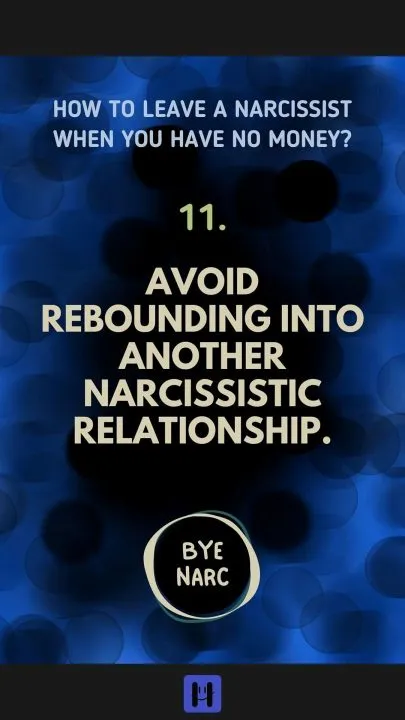
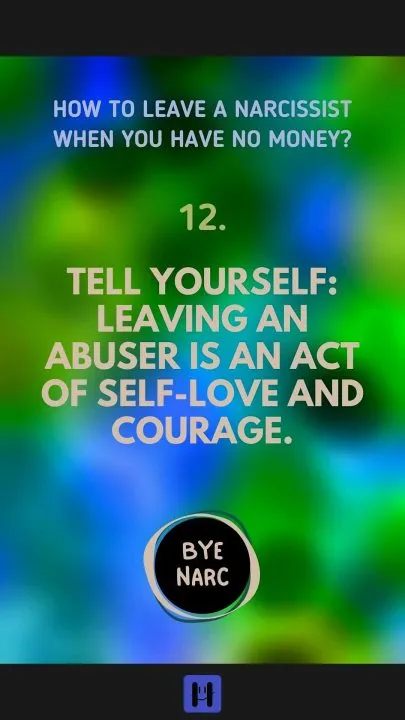
Why is it hard to leave the narcissist?
The main reason you can’t leave your narcissist is that you and your kids depend on him financially. When the narcissist provides a steady income for the family, and you don’t have any money to call your own, you continue to live in suffering.
Four reasons victims cannot leave a narcissistic relationship:
- Financial Dependence: The abuser in a violent relationship is often the only earner to support the family.
- Lack of Social Support: The victim fears being entirely alone after leaving the relationship, as they may have alienated themselves from their friends and family at the behest of the narcissist.
- Trauma-bonding: The narcissist builds a trauma-bond with the victim via intermittent reinforcement, alternating between affection and abuse, which keeps the victim emotionally tethered and hopeful for the return of positive interactions.
- Learned helplessness: The victim may continue in the abusive relationship because the narcissist has trained them into becoming helpless to think or act independently, or seek help from others.
Final Words
A high-conflict narcissist‘s fickle moods make it tough to leave them. To keep their narcissistic rage from flaring up, you keep trying to please them, hoping they will get better over time.
They won’t. So, stop trying to fix your narcissist. Instead, get away from them. Even from a safe distance, seeking revenge against the narcissist is a waste of your time and energy.
Focus instead on your own happiness, allow yourself to heal, and take the time to build a wonderful life for yourself.
You may contact a mental health professional to help you begin your post-traumatic healing.
• • •
√ Also Read: What fate awaits a narcissist in the end? (Good or Bad)
√ Please spread the word if you found this helpful.